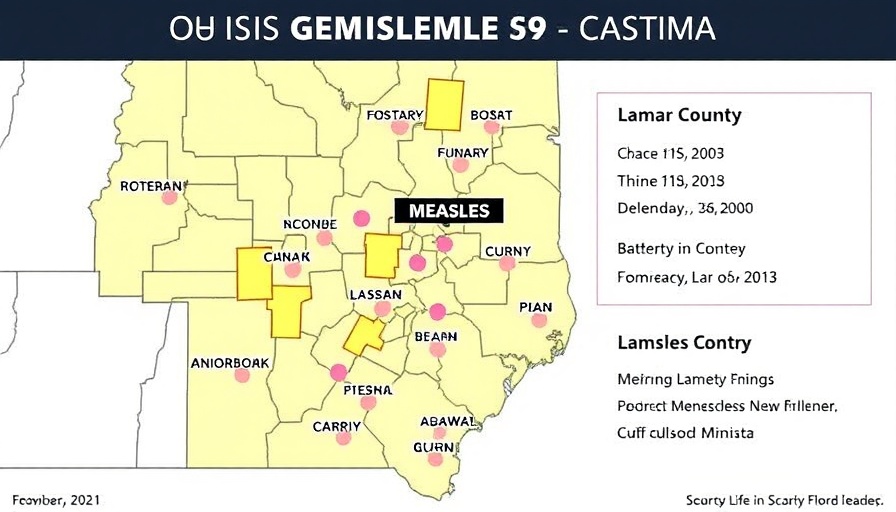
Measles Outbreak: A Growing Concern in Texas
In recent weeks, four confirmed cases of measles have emerged in Lamar County, Texas, raising alarms about the potential for a larger outbreak. The Paris-Lamar County Health District has reported that these new infections primarily involve individuals who are unvaccinated and who traveled to an area directly impacted by previous measles cases. This development is concerning, particularly as the state’s total climbs to 259 cases, a statistic that reflects a troubling resurgence of this preventable disease.
The Measles Virus: Understanding Its Contagious Nature
Measles is notoriously recognized as one of the most contagious viruses known to humanity. It spreads through respiratory droplets when an infected person breathes, coughs, or sneezes. The Centers for Disease Control and Prevention (CDC) states that approximately 90% of non-immunized individuals who come into contact with an infected person will contract the virus. With 34 hospitalizations and even a reported death, the urgency to address vaccine hesitancy and ensure community immunity could not be clearer.
Vaccine Hesitancy and Public Health
The general reluctance to vaccinate against diseases such as measles has been escalating in recent years, a trend that is worrying public health officials. Dr. Amanda Green, a prominent figure in the Paris-Lamar County Health District, emphasizes the importance of staying up-to-date on vaccinations. "Measles is a serious yet preventable disease. Vaccinations are the most effective way to safeguard yourself and your community from this highly contagious illness,” she states. Unfortunately, the modern anti-vaccination movement has significantly impacted immunization rates, leading to increased vulnerability among populations, particularly unvaccinated children.
Contextualizing the Measles Outbreak
While the present outbreak is centered in West Texas—particularly in areas like Gaines County where the majority of cases have been identified—measles cases are not limited to this region. States like California, New Jersey, and New York have also reported clusters of measles, indicating an ongoing public health challenge that transcends regional lines. As of today, nationwide efforts are underway to combat this resurgence, stressing the importance of community-wide vaccination.
The Importance of Community Awareness and Engagement
This unfortunate outbreak serves as a wake-up call for both individuals and public health authorities. Engaging community members through education and resources can change perceptions about vaccination. Public forums, informative campaigns in schools, and easy access to vaccination clinics are vital in reversing the trend of vaccine hesitancy. Making information readily accessible can empower individuals and families to make informed choices about vaccinations, thereby protecting their health and the health of those around them.
Looking Ahead: Predictions for the Future
As the cases continue to increase, predictions for the future of measles in Texas are concerning. Without a significant uptick in vaccination rates, health officials anticipate more outbreaks. The interlinked nature of modern travel means that local outbreaks can quickly contribute to statewide epidemics, as seen in the recent cases wherein infected individuals traveled to areas previously deemed free from measles.
Conclusion: Taking Action Towards Prevention
This outbreak is far from an isolated incident; it is part of a larger pattern challenging public health. It is crucial to foster open dialogues about vaccination, addressing myths and misconceptions that fuel fear and hesitance. For Texans, particularly those in Dallas and surrounding regions, staying informed and proactive about vaccinations is vital for protecting community health. If you or someone you know is unvaccinated or behind on routine vaccinations, now is the time to act. Consult local health resources to ensure you and your family are protected against measles and other preventable diseases.
 Add Element
Add Element  Add Row
Add Row 



Write A Comment